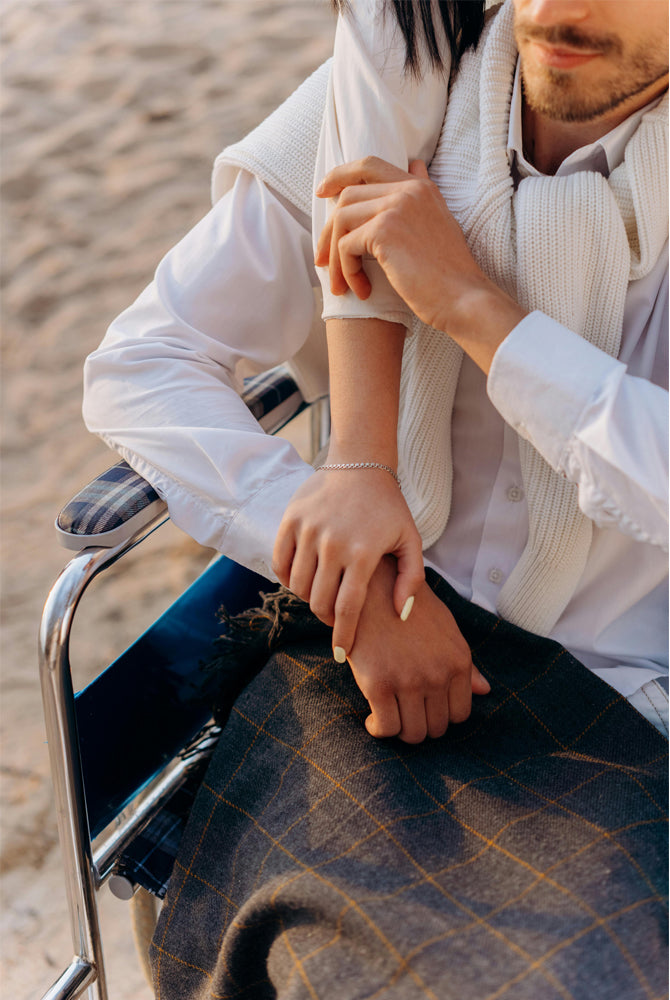When we speak of ‘the right to pleasure, we are addressing the issue of equality in an arena some of us may take for granted. We are all born with an internal desire, on a general level, to feel good, and because it is so natural, some may assume that it is easily accessible to everyone. This isn’t always the case though, particularly to those with disabilities and accessibility requirements that may act as a blockade to receiving pleasure. People with disabilities should be able to say, without any airs or graces, that we should be, and very much are part of the conversation when it comes to sex and pleasure. Don’t tip-toe around us, because newsflash: we exist and a lot of us are having sex. Really dirty sex and lots of orgasms. If the thought of people with disabilities having sex, enjoying pleasure, or masturbating never occurred to you - or worse yet, makes you feel cringe - then let’s get into why.
I want to begin first though, by addressing two facts. Firstly, no two people will experience disability the same, and therefore, it is impossible to speak on behalf of the disabled community as a whole; it would not only be futile but would minimalise the experiences of the disabled community to attempt to.
Secondly, anybody can become disabled at any given time, regardless of their lifestyle, background or upbringing. Therefore when we speak about the rights of people with disabilities, we are also discussing the rights of every person. As we grow old we will inevitably experience the need for increased care and support, and that’s before we even begin to discuss those who find themselves disabled suddenly or unexpectedly. So whilst you may think that the rights of people with disabilities are irrelevant to you, then I might suggest that not only would that suggest a lack of empathy or understanding, but you may one day find yourself requiring some degree of health support in your life. It’s an uncomfortable truth, but only because society sees people with disabilities as living on the periphery. It’s easy to see disability or ill-health as a myth when all you’ve experienced so far in life has been good health, and now see disability as something that happens to the ‘unfortunate few’, however with sources citing 24% of the UK having been affected by disability in 2022, it could not be further from the truth.
It’s a fact that people with disabilities often just get left out of the conversation. “Oh we didn’t think to make the venue wheelchair accessible… Sorry we don’t have online access to this event” etc. And when we analyse the industry of sexual wellness, it can seem as though it is yet another arena where the conversation can go on without inclusion. “Top 5 positions to try… if you have two functioning legs. New toys that will blow you away… as long as you have the dexterity to operate them.” However, it does seem as though the industry is beginning to wake up and smell the coffee, as we are thankfully seeing more representation, education, and accessibility in the products on offer.
Now, I could speak in more depth about the importance of representation in media and wider accessibility issues, but for the sake of limited word count, let’s focus for now on why access to pleasure is important for people with disabilities. (Or, perhaps more pressingly, why would you think it isn’t?)
I wonder if everyone thinks that because we are disabled, we don’t get horny? It’s laughable to consider, but in reality, the infantilization of people with disabilities is damaging. If the thought of someone with a disability wanting pleasure makes you uncomfortable, I invite you to question why that is.
Disabled people are acutely aware of the barriers in place when it comes to health care as a whole, but when society acts as though people with disabilities are in no need of, or worse yet are undeserving of access to pleasure, it can feel both alienating and isolating. There are also cases where people with disabilities are grossly fetishised, but are their own pleasure needs really being addressed in a meaningful and thoughtful way, or are they just being exploited? Sex experts acknowledge the physical and mental benefits of pleasure, the need for which is in no way diminished due to someone’s disability status. Viewing people who have disabilities, chronic long-term illnesses or support needs as somehow ‘other’ as opposed to intrinsic members of society, leaves them without these essential needs being met.
After waking up from my Multiple Sclerosis-induced coma I had to learn to walk and talk again, but I also had all the other comfort cravings; for Galaxy cookie crumble, for a Sephora facemask and, yes, for my vibrator.
Because people with disabilities want basic human rights, for our care needs to be met, but also to have a fat orgasm when we get turned on. It’s really not that deep. We can intellectualise the conversation as much as we want, but at the end of the day we can say that people who want to enjoy their bodies, have the bodily autonomy to be able to do so.
Whilst there has been a lot of conversation around sexual health and sex education, pleasure has been an overlooked factor of the landscape for too long. It is perhaps a murkier topic because it can not be discussed with as much clinical precision as other aspects of sex can, but pleasure is something that everyone is entitled to. Body autonomy is the principle that your body is your own and you have the right to self-ownership and self-determination, and the tools to make that possible when we talk about pleasure should be available.
In my single days, I felt like I wanted a shirt that read, “Don’t let my often urgent medical needs put you off, I’m actually really freaky in bed.” (Please, someone make this and send me 10 of them.) People can be frightened of disability, and it’s those ableist attitudes to disability that are the turn-off here, actually, babe, not my beautiful albeit slightly malfunctioning body. When we start to address these ableist attitudes, we can turn our focus to including people with disabilities when we manufacture products, educate about pleasure, and discuss the topic of sex overall.
Factors such as easy-to-use toys with adaptive designs can be such a huge factor in accessibility for many people with disabilities, allowing them the independence everyone deserves. As I mentioned, disabilities can vary, so what works for one person doesn’t necessarily mean it will for others, but perhaps before we even consider elements such as design and functionalities of masturbation aids, we must first remove this harmful question around whether disabled people ‘deserve’ pleasure.
Of course we bloody do, why would you think otherwise?

